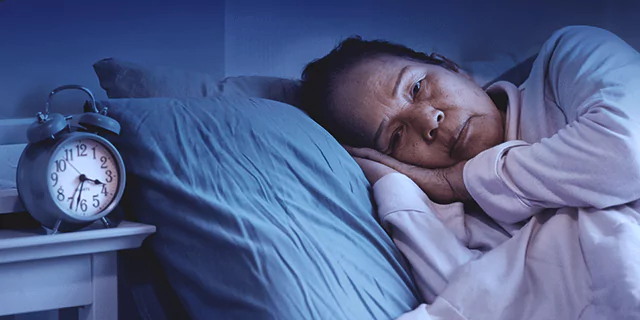How Glucose and Sleep Are Connected

Key Takeaways
Glucose, which is the fuel that powers your body, can quietly shape how well you sleep and how rested you feel the next day. If you’re doing all the right things (cutting caffeine, keeping a routine, trying every diet under the sun) but still wake up wired or groggy, unstable glucose may be the missing link.
What links sleep and glucose?
Sleep and glucose have a bidirectional relationship. In one direction, how well or poorly you sleep will directly impact your glucose levels. In the other direction, what your glucose levels are like going into the night and during sleep will impact your sleep.
Why does it matter? Glucose affects sleep, and sleep affects physical health. Short sleep duration—defined by the Centers for Disease Control and Prevention (CDC) as less than seven hours in a 24-hour period—can have a significant impact on your health. Adults who are short sleepers are more likely to have chronic health conditions like diabetes, obesity, or heart disease.
So, improving how you sleep can support your long-term health. And understanding your glucose is one of the best ways to start.
Why does sleep affect glucose?
The relationship between sleep and glucose levels is complex. Sleep is essential to allow your body to restore and repair itself. When you don't get enough sleep, several changes occur in your body. Let's explore them one by one.
Sleep impacts insulin levels
Sleep affects your hormone levels and your circadian rhythm. Your circadian rhythm naturally controls your sleep-wake cycle by responding to things like light and dark levels. Most people have a reasonably consistent circadian rhythm as adults. According to a study, even just one night of insufficient sleep can affect your body’s ability to use insulin effectively.
There is a small group of nerve cells that form what’s called the “master clock” in your brain. This internal clock controls hormone secretion, temperature, eating habits, and digestion. When your circadian rhythms are out of sync, your body's metabolic health can decline, and the risk for diabetes can increase.
According to Dr. Suzanne Manzi, MD, "poor sleep increases insulin resistance, leading to elevated glucose levels. This can heighten the risk of developing diabetes, as disrupted sleep patterns interfere with the body's ability to regulate glucose effectively."
Research published in the journal “Nutrition, Metabolism, and Cardiovascular Diseases” similarly has found that sleep deprivation reduces insulin sensitivity. This leads your body to produce more insulin to stabilize glucose levels.

Sleep regulates hunger hormones
Two hormones that regulate your appetite are leptin and ghrelin. Dr. Charles M. Carlsen shares, "ghrelin stimulates our appetite, causing us to feel hungry and crave high-calorie foods. On the other hand, leptin suppresses our appetite and signals to the brain that we are full. When these hormones are out of balance due to lack of sleep, we may be more likely to overeat and choose unhealthy food options."
Leptin plays several roles within your body. Two of its key jobs are long-term energy regulation and metabolism. You may have heard it referred to as the starvation or satiety hormone. Studies have found that short sleep duration reduces leptin levels, leading to overeating and weight gain. In turn, the craving to eat more results in an increased intake of carbohydrates, which raises glucose levels.
Ghrelin has the opposite function of leptin, increasing your appetite by telling your brain that your body needs more food. This is one of the reasons why certain fad diets often fail. When you don’t eat enough, ghrelin levels increase, making it harder to stick to your diet.
Another thing that increases ghrelin levels is lack of sleep. The surge in ghrelin prompts you to feel hungry, leading you to eat more carbohydrates, which will raise your glucose levels. There is also an added problem with high ghrelin levels, as it can reduce glucose tolerance.
Sleep impacts sympathetic nervous system activity
Sleep deprivation, or broken sleep, can lead to an increase in sympathetic nervous system activity. In stressful or dangerous situations, the sympathetic nervous system is what controls your “fight or flight” response. Lack of sleep can cause your “fight or flight” mode to kick in during the day and night, releasing stress hormones like cortisol.
When your sympathetic nervous system is overly active, it can reduce insulin secretion and promote insulin resistance. Both of these can lead to chronically raised glucose levels.
When glucose levels become raised, it can cause lifelong chronic conditions such as pre-diabetes, diabetes, or metabolic syndrome.
Sleep modulates inflammation
Research shows that sleep deprivation increases inflammation levels in the body. This effect can happen after even a single poor night’s sleep. Inflammation is one of your body’s defense mechanisms, providing valuable protection against viruses and bacteria.
But if inflammation is chronically high, it can lead to lifelong conditions such as metabolic syndrome, type 2 diabetes, heart disease, and obesity. It can also cause further complications and a poorer prognosis.

Sleep impacts brain function
Glucose is fuel for the brain. It provides the energy needed to carry out its functions. When you’re sleep-deprived, the metabolic activity in your brain decreases significantly.
Overall, studies state that sleep deprivation has damaging effects on brain function—particularly functions such as alertness, attention, decision making, and cognitive processes.
Sleep helps to regulate body fat
Sleep helps to maintain your body weight in many different ways, including regulating hunger hormones and insulin levels, as discussed earlier.
Research shows that a lack of sleep increases levels of free fatty acids in your blood. Those high fatty acid levels lead to a reduction in insulin sensitivity and hamper your body’s ability to metabolize fat.
Controlling glucocorticoid levels is another body fat regulator. Glucocorticoids are hormones that control several processes such as metabolism, inflammatory response, and brain function. One of the principal glucocorticoids is cortisol (also known as the stress hormone).
Studies show that when we’re sleep-deprived, cortisol levels increase both during that night of disrupted sleep and the following day’s long period of wakefulness. When cortisol levels increase, it can lead to insulin resistance. This can lead to an increase in glucose, weight gain, and potentially Type 2 Diabetes.
So, a lack of sleep negatively impacts your glucose levels in many ways. But what typically happens to your glucose levels when you get a good night’s sleep? Do you know what your normal glucose levels should be overnight?

What happens to glucose while you sleep?
In a healthy individual, glucose levels will go up and down while you sleep, which is normal. Despite this, they should generally stay within the range of 70-100 mg/dl.
There is a lot of research available on optimal morning fasting glucose values (after sleeping and fasting for at least eight hours) because these are the values that your physician or a researcher would test at a lab. This research tells us that an optimal waking fasting glucose value is between 70 and 90 mg/dL.
But there is less research available on what optimal glucose levels are while you’re sleeping. So, the advice is currently to aim for overnight glucose values within the 70-100 mg/dL range most of the night and overnight values that keep your 24-hour average glucose below 105 mg/dL.
To recap, the key glucose levels you are looking to maintain are:
- Glucose levels when asleep are between 70-100 mg/dL
- Optimal morning fasting glucose values between 70-90 mg/dL
- Overnight values that keep your 24-hour average glucose below 105 mg/dL
The "Dawn Phenomenon"
This is a regular occurrence that happens in every person. In the early morning hours, certain hormones (growth hormone, cortisol, and catecholamines) cause the liver to release sugar into the bloodstream. The process may cause a short-term increase in glucose. This is your body’s “natural alarm clock.”

For most people, the dawn phenomenon usually occurs between 4 am and 8 am, but it does depend on your sleep-wake cycle. Your glucose levels should come back down within a few hours following the release of insulin.
For those with insulin resistance and/or diabetes, glucose levels have difficulty coming back down after that morning surge. This can lead to higher-than-normal blood sugar levels at the start of the day.
How do glucose levels impact sleep?
Remember, sleep and glucose have a bidirectional relationship. Not only does a lack of sleep affect your blood sugar levels, but poor glucose levels also negatively affect your sleep.
That familiar 3 a.m. wake-up call
You wake up suddenly. A quick glance at the clock shows it’s 3 a.m., and your mind starts racing, making it a struggle to fall back asleep. You’ve been disciplined about getting a full seven hours, but these nightly interruptions leave you feeling tired and defeated the next day.
You wonder what you’re doing wrong, as it feels like another puzzle piece in your health that just won’t fit.
Both too low and too high glucose levels can have an impact on your sleep patterns.
High glucose
There are several reasons why high glucose levels affect your sleep:
- Pre-bed high glucose levels can affect the nervous system, making it hard to fall and stay asleep. This can trigger insomnia and increase cortisol and adrenaline levels, preventing your body from fully relaxing.
- You may need to go to the bathroom more often, disrupting your sleep. This is due to your kidneys trying to flush the excess glucose out of your body.
- High glucose can lead you to feel dehydrated, waking you from your sleep to rehydrate with a glass of water.
- They can also cause you to feel hot, irritated, and unsettled, making it difficult to sleep.
Low glucose
Low glucose can occur in both diabetics and non-diabetics. It can also be highly disruptive to sleep. Your glucose levels can drop due to stress, alcohol, insulin resistance, and other medical conditions.
Symptoms of low glucose include dizziness, lightheadedness, and blurred vision. Low glucose levels can affect your sleep in the following ways:
- It causes the release of cortisol and adrenaline. These hormones wake you up and stir your appetite.
- When trying to raise your glucose levels back to normal, your body overreacts by increasing your appetite. If you then eat when you should be sleeping, it can upset both your glucose levels and sleep-wake cycle.
- Low glucose levels can further disrupt sleep by causing insomnia, nightmares, sudden waking, and sweating.

Sleep glucose loop
The sleep disruption caused by high/low glucose levels can lead to a troublesome loop of both poor sleep and poor glucose control.
But, it’s not only sleep duration that impacts glucose levels, making this cycle even more complex. Sleep patterns also play their part in glucose control, so let's explore them a little further, too.
Find the right Nutrisense programto turn insight into progress.
Better sleep starts with understanding your body. Nutrisense helps you get there.
Better sleep starts with understanding your body. Nutrisense helps you get there.
Which sleep patterns impact glucose?
Sleep shapes glucose more than most people realize. Both how long you sleep and how well you sleep affect insulin sensitivity, cortisol, and overnight glucose trends. Here’s how common sleep patterns can push numbers up or help steady them.
Sleep deprivation
Sleep deprivation occurs when you don’t get enough sleep. The CDC recommends at least seven hours of sleep a night to maintain optimal health. Sleep deprivation is also a form of chronic stress, stimulating cortisol.
Inadequate sleep will raise glucose levels. There is no getting around it; if you are not getting adequate and sufficient sleep, then your glucose levels will be higher and increase your risk of insulin resistance. Full stop.
Sleep fragmentation
A fragmented night of sleep disturbs your periods of deep sleep. Newer research shows deep sleep (or slow-wave sleep) seems particularly important in regulating hormone balance. That includes both insulin sensitivity and glucose tolerance.
A study highlights that individuals with broken sleep patterns and severe sleep apnea are much more likely to have raised glucose levels.
Even if you get a total of eight hours of sleep, disruptions and lack of deep sleep can cause glucose levels to be higher. The study produced by the NHLBI advises that better quality sleep leads to better glucose control.

Sleep insufficiency
Sleep deprivation, sleep fragmentation, or a combination of both can cause sleep insufficiency. Once it sets in, it affects our everyday ability to maintain alertness, perform, and remain healthy.
It can lead to insulin resistance, as well. One research study showed that participants who slept 5 hours or less per night were more likely to develop diabetes compared with those who slept between 5 and 7 hours. The pattern was strongest in non-obese adults, men, and people under 60. Among those with obesity, sleeping more than 7 hours a night was linked to a higher risk.
REM sleep

REM sleep is a specific stage of sleep that occurs at various intervals throughout the night. During REM sleep, a person often has rapid eye movements, increased body movements, and a faster heart and breathing rate. This is often cited as one of the most important cycles of sleep for recovery and energy.
REM sleep has a positive effect on glucose levels, as research shows that levels decrease after 10-14 minutes during REM sleep.
Evening Habits to Test for Better Sleep and Glucose
To see how your evenings shape overnight glucose and sleep, run small experiments across a few nights using the same plan. Use 24/7 glucose patterns to compare nights for your body's glucose levels.
- Consistent meal times: Keep dinner at a consistent time, ideally 3 to 4 hours before bed.
- Specific bedtime snacks: If you prefer a snack, pair a complex carbohydrate with protein and fiber. Examples include apple with peanut butter, Greek yogurt with berries, whole grain crackers with cheese, or nuts plus fruit.
- Relaxation techniques: Build a wind-down routine such as 5 minutes of deep breathing, gentle stretching, reading a paper book, or a warm shower.
- Limit electronic screen exposure: Reduce bright screens or use night mode 60 to 90 minutes before bed to limit blue light.
- Caffeine, alcohol, and nicotine: Choose a personal cutoff time aligned with your sleep schedule.
- Sleep environment: Keep the bedroom dark and quiet, with a slightly lower temperature.
- Seek professional help for sleep disorders: If you notice loud snoring, gasping, restless legs, or persistent insomnia, talk with your clinician about conditions such as sleep apnea or restless leg syndrome.
In the Nutrisense App, log dinner time, snack content, bedtime, and notes about your wind-down. In the morning, review post-meal glucose and the overnight trace.
Over several nights, look for changes in glycemic variability, such as wider swings or a steadier line. If you track metrics such as standard deviation, note how they differ across nights before changing another variable.
Go beyond the numbers with Nutrisense
Your nightly glucose swings can explain more than you think—from restless sleep to that afternoon crash. Nutrisense helps you connect the dots between what you eat, how you sleep, and how you feel, so you can make simple changes that actually work.
“I'm sleeping better. My mood is stable, my energy is more consistent, and I don't have those afternoon crashes anymore!”
— Nutrisense member, Heather Maddox
Insurance-covered video calls
Access insurance-covered video calls (based on eligibility) with a glucose-certified expert: a personal registered dietitian or certified nutritionist who helps translate your data into real-life tweaks for better sleep, steadier energy, and progress you can feel.
Sensors and app
With the Nutrisense Program, you can monitor your glucose with health tech like glucose biosensors and continuous glucose monitor (CGM)s, and analyze the trends over time with the Nutrisense App. This will help you make the most informed choices about the foods you consume and their impact on your health.
Start with our quiz
Ready to sleep better and feel steadier? Take our quiz to find the right Nutrisense program to help you understand your body.
Go Beyond Glucose Data with Nutrisense
Your glucose can significantly impact how your body feels and functions. That’s why stable levels are an important factor in supporting overall wellbeing. But viewing glucose isn't enough. Nutrisense, you’ll be able to learn how to use your body's data to make informed lifestyle choices that support healthy living.
One-to-one coaching
Sign up to access insurance-covered video calls to work with a glucose expert: a personal registered dietitian or certified nutritionist who will help tailor your lifestyle and diet to your goals.
Monitor and measure what matters
With the Nutrisense CGM Program, you can monitor your glucose with health tech like glucose biosensors and continuous glucose monitor (CGM)s, and analyze the trends over time with the Nutrisense App. This will help you make the most informed choices about the foods you consume and their impact on your health.
Find your best fit
Ready to take the first step? Start with our quiz to find the right Nutrisense program to help you take control.

Kara Collier is a registered dietitian nutritionist and certified nutrition support clinician who is passionate about reshaping how we approach prevention, behavior change, and metabolic health. A Forbes 30 Under 30 honoree, she’s helped over 150,000 people improve their metabolic health using tools like continuous glucose monitors and behavior-focused nutrition strategies. Kara has been featured by Forbes, UC Berkeley, and HLTH, and has appeared on top podcasts like Mind Pump and The Genius Life.




